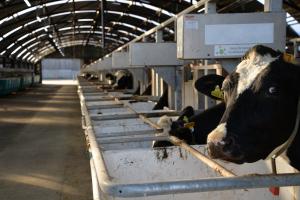This is a question that scientists at AFBI have been trying to answer within a project which is examining ‘precision feeding’ approaches for dairy cows.

Being able to improve the accuracy with which we can predict the intakes of dairy cows, either for the whole herd, or for individual cows, has been a key research objective for many years. If we are able to provide farmers and nutritionists with a more accurate estimate of how much food cows are eating, this will help them improve the accuracy with which cows are rationed, and has the potential to reduce the use of costly concentrates, and help lessen the environmental impact of dairy farming.
‘Machine learning’ is a type of artificial intelligence which involves computers discovering how they can perform tasks without being explicitly programmed to do so. This involves the computer developing algorithms that improve automatically through experience, similar to the way that humans learn to improve the accuracy of things they do. The research has involved applying the approach, together with a range of other mathematical modelling techniques, to dairy cow intake data derived from recent studies undertaken at AFBI. These studies all involved early lactation high yielding dairy cows which were offered grass silage based diets, and in which intakes were measured using a feed intake monitoring system.
Initial results have demonstrated that the approach is promising, so the next step is to expand the size of the dataset being used in the analysis. To achieve this, the research team are now preparing a dataset from 40 long term dairy cow experiments which were conducted over the past 25 years.
Dr Masoud Shirali, a geneticist and lead scientist involved in the work explains that ‘modern approaches such as machine learning offer many opportunities across a wide range of research areas, and this project has provided us with the opportunity to apply the approach to the very practical challenge of predicting dairy cow intakes. We are hopeful that working with a much larger dataset will allow us to improve the accuracy with which we can predict intakes’. This work is part of a larger project which is being co-funded by DAERA and AgriSearch.
Notes to editors:
AFBI is an arms-length body of DAERA delivering research and development, diagnostic and analytical testing, emergency response capability and expert scientific advice for DAERA and other government departments, public bodies and commercial companies in Northern Ireland, and further afield.
AFBI’s Vision is “Advancing the Local and Global Agri-Food Sectors Through Scientific Excellence”.
AFBI’s core areas:
- Leading improvements in the agri-food industry;
- Protecting animal, plant and human health;
- Enhancing the natural and marine environment.
Latest news
- AFBI issues Nematodirus warning – Spring 2025 11 April 2025
- Managing Nature Based Risks to the UK Economy and Opportunities for Green Finance 08 April 2025
- AFBI Hillsborough host AERA committee 27 March 2025
- The Omics Days Conference 27 March 2025
